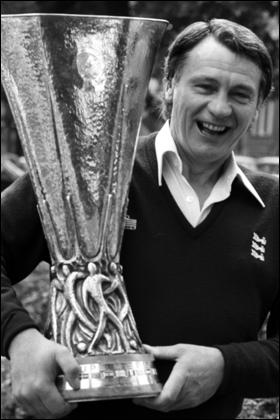
Sir Bobby Robson died this morning, having suffered many years from cancer.
Of course, he’s condemned to an afterlife as a kind of footballing Betjeman. A cross between teddy bear and moral exemplar, the outstanding memorial to the days when football had values (and passion and commitment and all of that). “They don’t make them like Sir Bobby anymore”. He deserves rather better, but it’s what he’ll get. One day, his ghost will be merged with the eventual shade of his Charlton namesake into a sort of Cow & Gate schmaltz. Or a union-jacked flavour for Ben and Jerrys, sold to children at Wembley pre-season nonsense tournaments.
Much will be made elsewhere of his gallant England years, so cruel and ultimately, so nearly successful. But everyone over 35 will remember another Bobby Robson, a younger, more dynamic and less cuddly individual who had turned Ipswich Town into a source of enduring fear and admiration.
After England, Robson went on to become one of that handful of English managers to achieve genuine success with proper European clubs. But I won’t remember him for that. I’ll remember instead two long, long nights beside my £1 auction battery radio listening to that at times agonizing home-and-away UEFA Cup Final victory. And I’ll remember a Saturday when I’d just started secondary school, and his Ipswich did this to Manchester United and no one was surprised. Robson then, alongside Taylor and Pleat, was a real kind of father figure to southern kids stuck in rugby schools who’d meet after school with a round ball and at lunchtimes with Subbuteo.
The commentator notes that United ‘keeper Gary Bailey was the son of the former Town keeper Roy. “Unfortunate that his father couldn’t make it from South Africa for this game.” Not really…
[youtube=http://www.youtube.com/watch?v=RrFiCJ5NxL4]
[youtube=http://www.youtube.com/watch?v=r-V12LB4x8E]
There are few managers that are loved. There are plenty of good ones and a few great ones, but not loved as this one was. Explain.
Newcastle ditched him. Observe, ye chairmen and boards – and fans – and learn.
Yeah, I used to listen to Town’s games on the radio as a kid in Suffolk, including that UEFA victory (I’m 42). What a team. That’s when Bobby became a legend in my mind, because he built an extraordinary team. Sir Alf and Sir Bobby and the heritage that is ITFC. They can have a kick-about together now.
Aye, but I thought I’d tried to explain. You have weeks of tributes to wade through if you think that I haven’t succeeded, and I’m quite happy to concede that I haven’t.
What strikes me most of all is his desire to live. Foiled now. I remember two things in respect of that: a man , imminently dying of cancer addressing in my presence an audience of drug addicts and saying “I want to live – I want to live, lend me the bodies you so evidently don’t want so that I can live..” and, another man, newly diagnosed of GM4, ( the most lethal form of brain tumour) sitting with me whilst a summary of recent brain tumour research and his potential life expectancy was read out in front of us.
The UK is full of people who know they are going to die, and die soon. And not at 76; I think they deserve celebration and remembrance – to whatever result. 1933 is Peter Scupham’s year, and that I find frightening. People who’ve helped you.
I was not engaged with English football at that time. I was in the US for most of his England career. I did admire the work he did with Newcastle. Very inspiring man.
“Of course, he’s condemned to an afterlife as a kind of footballing Betjeman. A cross between teddy bear and moral exemplar, the outstanding memorial to the days when football had values (and passion and commitment and all of that). “They don’t make them like Sir Bobby anymoreâ€. He deserves rather better, but it’s what he’ll get. ”
Not sure what you mean, do you think he should be remembered more as a great football coach, because by all accounts he wasn’t. Or the achievements of making a teeny club compete with best, fair enough.
Personally reading all the stories of his personal kindness move me far more than accounts of football victories, is that a bad thing?
Booby died having suffered from many year in cancer.